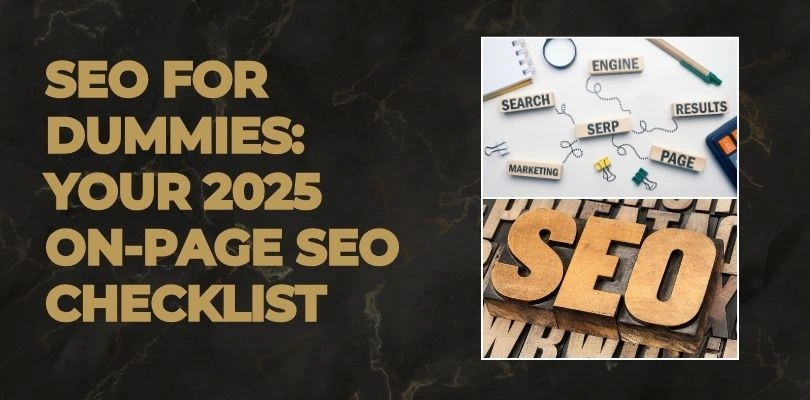Hey there! I’m Anthony Graydon, and today we’re diving into a topic I get asked about all the time: on-page SEO. The search engine optimisation world is always evolving, and with 2025 on the horizon, it’s important to stay updated on the essentials of optimising your website’s pages. The thing about on-page SEO is that it’s not about gaming the system or trying to trick search engines—it’s about genuinely improving your content and site structure to serve your audience better. So, let’s walk through this step-by-step guide together.
1. Why On-Page SEO Matters in 2025
One question I often get is, “Why should I worry about on-page SEO when there are so many other aspects to SEO?” The answer is simple: on-page SEO is the foundation of a successful website. It’s what makes your site accessible, understandable, and, importantly, appealing to search engines and users alike.
Imagine you’ve built a beautiful store with amazing products. But if the store is hidden away without any signs or labels, no one will find it. On-page SEO is like putting up those signs, labeling your shelves, and making it easy for people to see what you offer. This part of SEO helps search engines like Google understand your page content, making it more likely for you to show up in search results.
In 2025, search engines are more sophisticated than ever. They prioritise content that’s not only relevant but also genuinely useful. So, your focus should be on creating value for your visitors. High-quality, optimised content can drive organic traffic, and with the right strategies, it can help build your credibility and authority online.
2. Keyword Research and Placement
Let’s kick things off with a core element of on-page SEO: keyword research. A lot of people assume that once you find a good keyword, you just throw it onto your page and expect results. But effective keyword usage is a bit more nuanced than that.
How to Find the Right Keywords
In 2025, keyword stuffing is long gone. Instead, the focus is on finding keywords that match user intent. Tools like Ahrefs, SEMrush, and Google Keyword Planner can help you identify phrases that people are actually searching for. But don’t just go for the keywords with the highest volume—consider the search intent behind them. Ask yourself:
- What information is the user looking for?
- Are they researching, looking to make a purchase, or seeking an answer to a specific question?
Where to Place Keywords
Once you’ve nailed down your keywords, it’s time to strategically place them throughout your page:
- Title Tag: This is the first thing users and search engines see, so make sure it includes your main keyword naturally.
- Meta Description: While it doesn’t directly impact rankings, a well-crafted meta description can improve click-through rates.
- Headings and Subheadings: Use your keyword (and related terms) in your H1, H2s, and H3s to give structure to your content.
- First 100 Words: Mention your main keyword early in the article to signal its importance.
- Image Alt Text and Captions: Not only does this make your content accessible, but it also helps search engines understand your images.
By placing keywords naturally, you avoid sounding robotic and maintain a conversational tone—just like we’re doing here!
3. Crafting SEO-Friendly Titles and Meta Descriptions
A catchy title and an engaging meta description aren’t just for show; they’re essential for grabbing users’ attention and increasing click-through rates. In 2025, the competition for attention in search results is fierce, and your title and meta description are your first chance to make an impression.
Writing an Effective Title Tag
Your title should be concise, ideally under 60 characters, and should incorporate your main keyword. But more than that, it should be engaging! Think about what would make someone want to click. For example, instead of “On-Page SEO Tips,” a more inviting title could be, “Ultimate 2025 On-Page SEO Checklist: Boost Your Rankings Today!”
Crafting a Compelling Meta Description
For your meta description, aim for about 155-160 characters. Summarize what the user will find on your page, and try to include a call to action. Here’s an example:
“Learn the top on-page SEO tactics for 2025 to improve your site’s visibility and user experience. Follow this step-by-step checklist to rank higher!”
4. Optimise Your Content for Readability
One of the biggest SEO trends in 2025 is content that’s easy to read. Search engines prioritize user experience, and if your content is clear and engaging, people are more likely to stay on your page and explore further.
Tips for Readable Content
- Short Paragraphs: Keep paragraphs to 2-3 sentences to make the text less daunting.
- Bullet Points and Lists: Break up information into bullet points or numbered lists to enhance scannability.
- Subheadings: Guide readers through your content with clear, descriptive subheadings.
- Simple Language: Avoid jargon unless necessary, and when you do use it, be sure to explain.
Readable content isn’t just for SEO; it’s for your audience. When people find it easy to consume your content, they’re more likely to stay, engage, and come back.
5. Image Optimisation: Beyond Just Alt Text
Images can make or break a user’s experience on your page. But did you know that optimised images can also improve your on-page SEO? In 2025, visuals are key to keeping users engaged, and they can even help with rankings.
Best Practices for Image Optimization
- Use Descriptive File Names: Before uploading, rename your image files to something descriptive. For example, instead of “IMG_1234.jpg,” use “on-page-seo-checklist-2025.jpg.”
- Add Alt Text: Alt text helps search engines understand the image and is crucial for accessibility. Describe the image in a way that’s helpful and relevant.
- Compress Images: Large images can slow down your site, which is a big no-no for both user experience and SEO. Use tools like TinyPNG or ImageOptim to reduce file sizes without losing quality.
- Choose the Right Format: For photos, go with JPEG; for graphics, PNG is often best. And don’t forget about WebP, which is a newer, highly efficient format that can boost load speeds.
6. Internal Linking: Connecting the Dots
Internal linking is one of the easiest yet most effective on-page SEO strategies. When done right, it can guide users through your site, improve their experience, and help search engines understand the structure of your site.
How to Implement Internal Links
- Link to Relevant Pages: Connect related topics to keep users engaged and show search engines the relationship between content.
- Use Descriptive Anchor Text: Avoid generic phrases like “click here.” Instead, use anchor text that gives context, like “learn more about on-page SEO strategies.”
- Link to New and Old Content: Don’t just link to recent posts; link to older, valuable content too. This helps keep all pages of your site active and discoverable.
7. Mobile Optimisation: A Must for 2025
With the majority of web traffic coming from mobile devices, ensuring that your website is mobile-friendly is essential for on-page SEO in 2025. If your site doesn’t perform well on mobile, you risk losing a large portion of potential traffic.
Mobile Optimization Tips
- Responsive Design: Use a design that adjusts seamlessly to different screen sizes.
- Font and Button Size: Make sure text and buttons are easily tappable.
- Optimize for Touch Navigation: Users should be able to interact with your site without accidentally clicking the wrong elements.
8. Page Speed: Faster is Better
Page speed is another major factor in on-page SEO. In 2025, users expect pages to load in seconds, if not instantly. A slow-loading site can lead to higher bounce rates and lower search engine rankings.
Improving Page Speed
- Minimize HTTP Requests: Limit the number of elements on your page that require separate requests.
- Enable Compression: Compress large files to reduce load times.
- Use a Content Delivery Network (CDN): A CDN can deliver content faster by storing it closer to the user’s location.
9. Conclusion: Start Optimising Today!
On-page SEO doesn’t have to be overwhelming. By focusing on these key elements—keyword research, content readability, internal linking, and more—you can make your website more appealing to both users and search engines. Remember, the goal is to provide real value, not just to rank higher. When you put the user first, the results will follow.
That’s your on-page SEO checklist for 2025. So, get out there and start optimising! And if you have any questions, drop a comment—I’d love to hear from you.
Click here to learn more about how I can help you improve your website search engine rankings.
Discover more from Cheap Web Design UK
Subscribe to get the latest posts sent to your email.




